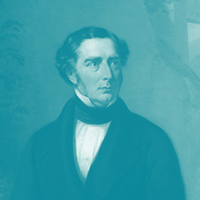Articles
Robert Stephenson, second president of the IMechE and designer of the Rocket
 As the only son of George Stephenson, the first president of the IMechE and the ‘Father of Railways’, Robert Stephenson had a lot to live up to. Thankfully, he more than managed it, and became known as the greatest engineer of the 19th century.
As the only son of George Stephenson, the first president of the IMechE and the ‘Father of Railways’, Robert Stephenson had a lot to live up to. Thankfully, he more than managed it, and became known as the greatest engineer of the 19th century.
Acclaimed for his work developing the construction of wrought-iron bridges that carried railways over valleys and rivers, his name is perhaps now most associated with the Rocket, a steam locomotive that won the Rainhill Trials of the Liverpool and Manchester Railway in 1829.
Built at his Newcastle factory, the Rocket was the most advanced locomotive of the day. The Science Museum, which displayed it until 2018, says it “represented a substantial advance over previous designs” thanks to the combination of developments such as the multi-tube boiler and the blast pipe. It averaged speeds of 12mph during the trials and a top speed of 30mph, securing Stephenson a contract to produce locomotives for the first-ever inter-city railway.
Helen Simpson, innovation and projects director at Porterbrook
 Buying a fleet of brand-new trains comes at some cost – one that might be avoidable with some well-placed upgrades to existing rolling stock. For Helen Simpson, projects have included an anti-lock braking system, an exhaust retrofit to reduce NOx emissions, and a battery-enhanced hybrid drive system.
Buying a fleet of brand-new trains comes at some cost – one that might be avoidable with some well-placed upgrades to existing rolling stock. For Helen Simpson, projects have included an anti-lock braking system, an exhaust retrofit to reduce NOx emissions, and a battery-enhanced hybrid drive system.
Simpson, who is also an interview assessor for the IMechE, has worked on these systems since joining Porterbrook seven years ago. She has worked in rail for 29 years, starting with a graduate training scheme, going through “lots” of different placements, followed by experience in train operations and rail consultancy. Now she is focused on bringing new innovations and technology to existing trains.
Recent work has been focused on Hydroflex. The prototype retrofit train, showcased at the Cop26 climate-change conference in Glasgow, combines electric, battery and hydrogen power into a ‘tri-mode’ zero-emission vehicle. Capable of carrying enough hydrogen for a range of 300 miles, the train’s 400kW fuel-cell system is supported by a 400kW battery. It is aimed at enabling onward journeys beyond electrified routes, providing zero-carbon transport without immediate investment in overhead wires, and without passengers having to change trains mid-journey.
“In rail we’re already a very green, sustainable mode of transport, but we want to stay in that position,” says Simpson. “As other sectors do their bit, and we see battery cars and trucks in the automotive sector, then rail also has to respond.”
Hydrogen is stored on Hydroflex in large tanks at 350bar, but Simpson says metal-hydride storage or on-board electrolysis might be explored as potential options.
Looking ahead, she says Hydroflex is playing an important part in demystifying the use of hydrogen in rail, and proving it can be done safely. “By building a prototype, and then maybe making a small fleet of retrofit trains, that’s a stepping-stone and gives you a way to buy new-build trains in the future,” she says. “A lot of the big manufacturers are working on new-build hydrogen trains, and I really hope we can build on the knowledge that we’ve gained on this project to put into new-build hydrogen trains in the future in the UK.”
Make sure to check imeche.org/news throughout the week for more stories on Forward Thinkers, from nuclear energy pioneers to zero-emission aviation experts.
To find out more about the IMechE's 175 celebrations, visit the official home page.
Want the best engineering stories delivered straight to your inbox? The Professional Engineering newsletter gives you vital updates on the most cutting-edge engineering and exciting new job opportunities. To sign up, click here.
Content published by Professional Engineering does not necessarily represent the views of the Institution of Mechanical Engineers.